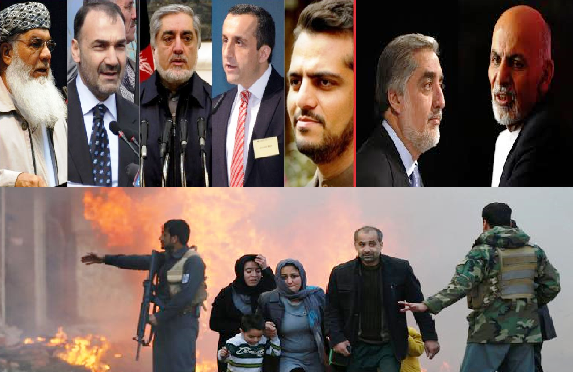To which direction is the country’s political and security situation headed?
The political tensions over the governance of Balkh Province and the recent consecutive security incidents in the country have increased concerns about the security and political instability in the country.
Even though due the issue of the governance in Balkh no security incident has occurred yet, such issues increase concern about the security and stability as first the US Ambassador and then the White House commented on this issue.
It is at a time that the deterioration of the security situation in the country have increased the concerns of the Afghan public, as only in the past two weeks the capital of the country witnessed several attacks and explosions, leaving hundreds killed and injured.
To which direction is the security and political situation in the country headed? What are the factors behind the current situation? Will the National Unity Government (NUG) be able to control the situation? These are the questions that are answered here.
The current political tensions
In the past one and half decade and particularly in the past three years of the NUG’s term, the country’s political scene was tenuous and full of disagreements; however, these disagreement have taken a new color and it seems that the government is weakening against some power circles.
When the Presidential Palace assigned a new governor for Balkh province and the former governor of Balkh province Atta Mohammad Noor resisted against this decision, for the first time, a local official was challenging the central government. Atta organized several gatherings of his supporters and threatened the government. Nevertheless, the Presidential Palace is yet to respond to the remarks of Atta.
After the prolongation of these disputes, the US Vice President Mike Pence talked with President Ghani through a phone call, later the US Ambassador to Afghanistan commented in this regard and then the White House also cleared its stance through issuing a statement. Moreover, the former US envy to the UN, Afghanistan, and Iraq and a man close the US president Zalmay Khalilzad also made remarks against Noor during an interview, something that apparently shows the US support from the NUG against Mr. Noor. Nevertheless, in this regard, there exist two analysis:
First; as the international community and particularly the US is concerned about the power circles out of the government in Afghanistan because other international players are getting more and more engaged in the Afghan issues, the US’s long-term interests in the region are threatened.
Second; as same as the 2014 electoral crisis followed with the formation of the NUG, the current situation is a new scenario. Thus, the Afghan crisis find new aspects and the international players are seeking their interests in deepening this crisis.
Security instability
Besides the political instabilities, the security situation in the country is also worsening on a daily basis. The bloody incidents in Kabul in the past two weeks have resulted in shifting people’s attention from the political disagreements to the insecurity in the country. The attack on the Intercontinental Hotel and then the bloody explosion on the Sadarat Road killed approximately 150 and injured more than 250. These attacks inflicted heavy casualties to the Afghan civilians.
Although apparently the Taliban’s recent attacks put a major impact on the peace process and first the US and then the Afghan government boycotted the peace talks with the Taliban, from the US’s policy towards Afghanistan before the attack it was clear that the war strategy was undertaken and there existed concerns that 2018 would be bloody for Afghans.
After the bloody attacks in Kabul, a statement released by the Taliban show that this group was neglected in the political scene and particularly in the areas of the reconciliation and through making remarks about the presence of other military groups in Afghanistan, the Afghan government was trying to undermine the Taliban’s military threat and that was why the Taliban wanted to put pressures through these attacks. However, the recent attacks in Kabul had very negative effects on the Taliban.
Overall, the basic problem is undertaking the war strategy instead of peace that has led to all these troubles. Even until now, in the peace process, the Afghan government have spent all its energy on pressurizing Pakistan so that this country should bring the Taliban to the negotiation table; however, it seems that Pakistan neither wants nor can do it.
The US’s war-centered strategy have also resulted to the concern and fear of the regional powers from the US’s presence in Afghanistan and, hence, to their support of the government’s oppositions, something that further reduces the probability of peace and reconciliation in the future.
Conclusion
Currently, it seems that the government will continue to ignore political disagreements; however, it will end the problem raised on the governance of the Balkh province. Still the settlement of tensions between the government and the Balkh’s governor will be a major issue for the NUG.
Overall, it seems less likely that the issue of Balkh province will result to violence. However, concerns exist about prolongation of the issue and the prolongation of the issue will increase the probability of the analysis about international players’ involvement in the issue.
The country’s security situation is, to a large extent, relevant to the US and the Afghan government’s peace and war strategy against the Taliban. Currently, it seems that all parties, including the US, the Afghan government, and the Taliban will focus on war, which will further intensify the situation. The increase in the security instabilities will pave the way for the political opponents to increase pressures over the government and will directly result in increasing political differences.
The End

